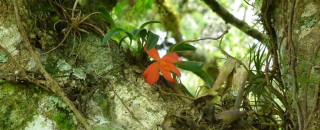Trailblazing Women in Science: Nalini Nadkarni
By Riley Black
It's hard to care about what we can't see. With our feet firmly planted on the ground, looking up, the life that thrives in the canopies of the world's forests might seem as distant as those at the bottom of the ocean. But by climbing up to the tops of tropical forests, University of Utah ecologist Nalini Nadkarni has seen how life thrives among the leaves - and how important life in the canopies is to our planet.
Nadkarni's fascination with the world's forests stemmed from a long standing puzzle - how are rainforests so full of life when the soil is so poor in nutrients? The question took her high up into the canopies of Costa Rica where she found that interactions between the trees and other plants helped provide the basis for the rainforests' rich growth. The secret wasn't in the soil, she learned, but in how plants that grow on trees - called epiphytes - made nourishing ecosystems in the air.
But Nadkarni has done much more than study rainforests. These precious ecosystems are under increasing threat from habitat destruction and global climate change. The rainforest canopies host species we don't even know about yet in addition to those that remain little-understood. To save these magnificent places, Nadkarni has been a prominent voice for rainforest conversation and has teamed up with faith-based groups, artists, and more to underscore how the world's forests deserve and need our protection. Nadkarni even co-founded the Science in Prisons programs, providing education and assistance that helps inmates and communities in Utah and across the country. Nature is not just something to be studied, her vast body of work suggests, but to be shared.
Nalini Nadkarki spoke on April 15 as part of NHMU's 2021 Lecture Series.
Riley Black is the author of Skeleton Keys, My Beloved Brontosaurus, Prehistoric Predators, and a science writer for the Natural History Museum of Utah, a part of the University of Utah in Salt Lake City. Our mission is to illuminate the natural world and the place of humans within it. In addition to housing outstanding exhibits for the public, NHMU is a research museum. Learn more.



